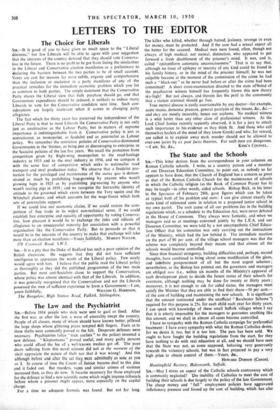The State and the Schools
Sia,—This letter derives from the correspondence in your columns on Roman Catholic schools. I write, as a country parson and a member of our Diocesan Education Committee, to point out, as nobody so far appears to have done, that the Church of England has a concern as great
• as that of the Roman Catholic Church for the maintenance of schools in which the Catholic religion (as the Book of Common Prayer has it) may be taught—in other words, aided schools. Bishop Beck, in his letter in the Spectator of February 24th, gave figures which can be taken as typical both of his problem and ours: I can give almost exactly the same kind of estimated costs in relation to a proposed junior school in my own parish. The root cause of all our problems lies in the building regulations which, as a schedule to the Education Act, were never debated in the House of Commons. They always were fantastic, and when we managers said so at meetings convened jointly by the L.E.A. and our Diocesan Committee, we were told by a not unsympathetic Chief Educa- tion Officer that his committee was only carrying out the instructions of the Ministry, which had the law behind it. The immediate reaction on the part of 90 per cent, of the village school managers was that the scheme was completely beyond their means and that almost all the schools would become controlled.
Since then financial stringency, building difficulties and, perhaps, second thoughts, have combined to bring about some modification of the clans, and indefinite postponement of all but the most urgent schemes ; nevertheless, as the Bishop has pointed out, the governors and managers are obliged now (i.e., within six months of the Ministry's approval of each development plan) to decide the future status of their schools for evermore, although nothing may be done for twenty or thirty years ; moreover, it is not enough to ask for aided status, the managers must satisfy the Minister that they are able to find their share-50 per cent.— of the cost of building and maintaining the new schools. It is significant that the amount (estimated under the unofficial !' Barchester Scheme ") required for this purpose is 25s. for each child each year for thirty years. I can speak with knowledge of these small Suffolk villages when I say that it is utterly impossible for the managers to guarantee anything like this amount, and we shall in almost all cases become controlled.
I have no sympathy with the Roman Catholic campaign for preferedtial treatment: I have every sympathy with what the RomanCatholics desire, for we desire it, too, but it is too late. The pass has been sold. We ought to have fought the building regulations from the start, for they have nothing to do with real education at all, and we should have Seen that the State was not, as some supposed, behaving very generously towards the voluntary schools, but was in fact prepared to pay a very high price to obtain control of them.—Yours, &a.,


































 Previous page
Previous page